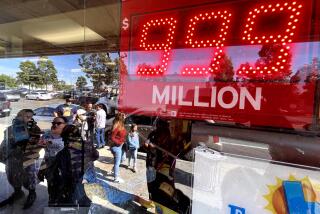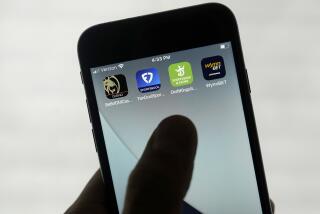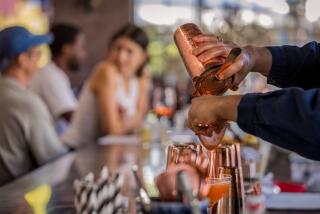You can enter a drawing to buy rare liquor in Utah. Just don’t call it a lottery
Utah isn’t exactly a heavy-drinking state. Almost two-thirds of the population is Mormon, a faith that bars the consumption of alcohol.
But for thirsty apostates, a limited release of $270-a-bottle Pappy Van Winkle 23-year reserve bourbon is game-on.
“It was just nuts,” said Terry Wood, spokesman for the Utah Department of Alcohol and Beverage Control, describing what happened last year when the state’s 46 liquor stores received a total of 110 bottles.
“People would race from store to store,” he said. “There were long lines in cold weather. Some people were trying to game the system or bet on what stores would have it and show up there.”
The scramble for Pappy has been a routine occurrence, with local media coverage that makes it look like the Black Friday shopping frenzy.
The agency needed to do something, Wood explained.
So to deal with one vice, it looked to another: gambling.
Several other states already run drawings for Pappy and other high-end liquors for which demand dramatically exceeds supply.
Two years ago, Utah alcohol authorities suggested they try something similar, proposing a system in which people are randomly selected for the opportunity to buy rare spirits from state-run liquor stores.
If alcohol is frowned upon in Utah, gambling is even more so. With a criminal code that spends 12 sections detailing all manner of wagering that is illegal, Utah is just one of two states in the country with no lottery. It has no casinos or horse racing, either.
The prohibition is even in the state constitution.
Pressure building to take down Utah’s ‘Zion Curtain’ liquor law »
Still, the state liquor agency looked north to see how Idaho was doing it.
Without all the legal wrangling, it turned out. The state simply uses its lottery system to run a liquor lottery.
It didn’t hurt that Jeff Anderson, Idaho’s state liquor division director, also happens to be director of Idaho’s lottery.
Pennsylvania also calls its liquor drawing a lottery. So does Ohio. And Virginia.
When Utah’s alcohol department pitched its plan, the state attorney general was clear: No dice.
Undeterred, the liquor agency found what it thought was a loophole. The Utah Division of Wildlife holds a drawing for hunting permits. What was the difference?
Totally different, the attorney general said.
The hunting permit system isn’t completely random as it stacks the deck in favor of hunters who have been applying the longest. It’s also a way to assist in conservation efforts by keeping wildlife populations — considered a state resource — under control.
Alcohol, the attorney general argued, isn’t a state resource that needs to be managed. It’s a product for sale.
There were also concerns that a drawing for the right to buy alcohol could open the door to other types of lotteries.
The state liquor agency persisted. People complained that the current system was unfair. There were reports of loose lips at the state warehouse for alcohol and certain people being tipped off about Pappy releases. Lines for those at the state’s stores weren’t getting any shorter.
“It was chaos,” Wood said.
But the attorney general’s office wasn’t budging.
Wood said his bosses made their case again: The drawing wasn’t gambling. They explained no cash was required to enter. Most anyone of legal drinking age could enter. There was no prize — only the right to make a purchase.
Richard Piatt, spokesman for the attorney general’s office, said this year it warily gave the state alcohol agency the go-ahead for a test run. It could not be called a lottery.
“We are referring to it as ‘a distribution system for a limited-quantity product,’” he said.
The first one, called the “Rare High Demand Drawing,” will commence Tuesday, when the Department of Alcohol Beverage Control Commission holds its monthly meeting.
Only state residents are eligible to apply. State employees, restaurants and bars with liquor licenses are barred.
People will register online. Names will be picked at random by a computer program, Wood said: “The IT department has been working on it for weeks.”
The winners will be notified with an email, which they can present at a state liquor store within two weeks to purchase a bottle.
The program is a 90-day trial run. Wood said the state would make tweaks as it goes and the drawings would also include other brands that are rare and sought-after, including Blanton’s and Whistle Pig.
Tom Fischer, a bourbon expert and blogger, said the zeal for high-end liquors has been climbing for about a decade now and has spanned all states — including Utah. He said before 2003, there were only about about 100 craft distilleries in the country. Now there are about 2,000. Bourbon, he said, falls under the umbrella of whiskeys and there are new ones coming out regularly.
Armed with only a martini and a long memory, former Vegas mayor talks mobsters, ‘rats’ and Trump »
He said some people purchase the bottles to resell for a profit while others post them on social media to burnish their reputation as an acquirer of rare liquors. A few, he said, just want to add a bottle to make it a centerpiece of their bar at home.
Fischer said the aging process is what limits the supply and drives up the price. The more it ages in charred oak barrels, the better it gets.
“You can taste different notes throughout your mouth. It has more depth and tastes more refined,” he said. “I’m glad more people will now have a chance to try a superb whiskey.”
The primary concern of the Utah alcohol agency, Wood said, is that the attorney general’s office will change its opinion and deem the drawing a lottery — leaving liquor authorities back at square one.
The attorney general’s office said it will be watching closely.
The delicate detente is a relief to high-end liquor hunters such as Paul Burbank.
“It’s the only reasonable way to do it at this point,” he said of the new system.
He recalled waiting in line a few years ago to purchase a bottle of Pappy Van Winkle’s 23-year reserve at a state-run liquor store in the Salt Lake City suburb of Cottonwood Heights. There was still snow on the ground when he got to the store almost three hours before it opened.
He didn’t score the bottle. Instead, he had to settle for a 10-year Pappy — one he still hasn’t opened yet.
More to Read
Start your day right
Sign up for Essential California for news, features and recommendations from the L.A. Times and beyond in your inbox six days a week.
You may occasionally receive promotional content from the Los Angeles Times.







